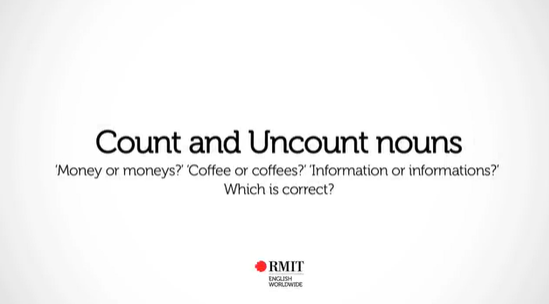Note-taking skills
When taking notes, you don't need to write everything down. Here's some advice about how to capture the most important information while note-taking.
'Money or moneys?' 'Coffee or coffees?' 'Information or Informations?' In this lesson, James Harvey, a teacher at REW, explains the difference between these nouns and which ones are correct.

'Money or moneys?' 'Coffee or coffees?' 'Information or Informations?' In this lesson, James Harvey, a teacher at REW, explains the difference between these nouns and which ones are correct.
Today's tip is about countable and uncountable nouns in English. This is actually quite a big topic with some rules and exceptions. I'll just cover the basics for now.
Count nouns, refer to things that can be counted and made into plurals. A hundred dollars, six kilometres, three children, non-count, or uncountable nouns, refer to things that cannot easily be counted, such as ideas expressed by the words, money, wisdom, love, travelling.
These usually have no plurals. Non-countable nouns can also refer to materials such as paper, liquids, such as water and some mass foods like rice and corn. In all cases, the uncountable things do not have clear boundaries. It is hard to count them. It's important to remember that with a word like money, it is this word, which is not usually countable. Once you divide the money into a unit of measurement and use words like dollars and cents, then of course you can count these units.
It's the same with the word rice. You don't say rices, but you can say three cups of rice. Here are two sentences, which contained two common errors. Can you identify them? Correct. The box contained many photos of my family. Why? Because we can count photographs easily.
Correct. We have ordered new office equipment. Why? This is because 'equipment' is a noun, which expresses an idea of many different things in an office. If you split up the idea into separate items like desks and chairs, then these words are of course, countable.
When taking notes, you don't need to write everything down. Here's some advice about how to capture the most important information while note-taking.
Acknowledgement of Country
RMIT University acknowledges the people of the Woi wurrung and Boon wurrung language groups of the eastern Kulin Nation on whose unceded lands we conduct the business of the University. RMIT University respectfully acknowledges their Ancestors and Elders, past and present. RMIT also acknowledges the Traditional Custodians and their Ancestors of the lands and waters across Australia where we conduct our business - Artwork 'Luwaytini' by Mark Cleaver, Palawa.